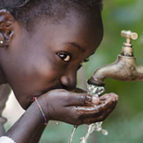Every child deserves a chance for a better life.
This is the belief shared by nearly 30,000 Salesian missionaries (priests, brothers, sisters and novices) in over 130 countries around the globe. These missionaries live and work within the communities they serve — many located in the poorest places on earth.
Salesian Missions raises funds for programs that are carried out by these missionaries. The organizations they represent are also part of the Don Bosco Network, a worldwide federation of Salesian NGOs working together to assist and empower the world’s most vulnerable youth and families. What sets this work apart is the focus on self-sufficiency through education and opportunity (which ends the cycle of poverty).
Millions of youth facing adversity have received services specifically funded by Salesian Missions and its generous donors. These programs are provided to children regardless of race or religion.
Salesian Missions and its partner NGOs are innovative and skilled at designing programs that are customized to meet the immediate needs of the specific communities they serve. Therefore, the programs are vast but generally fall into one, or more, of the program categories listed below.
EDUCATIONAL OPPORTUNITIES
Globally, the Salesians provide education and support through more than 5,500 schools and youth centers serving millions of children; more than 80 colleges and universities; nearly 1,000 vocational, pre-professional and training programs; more than 40 professional degree programs; more that 40 agricultural educational programs; and nearly 90 adult educational centers. As a result, children, youth and young adults in some of the poorest places on the planet are receiving an education. Education gives vulnerable youth a sense of personal dignity and self-worth, breaking the cycle of poverty. At Salesian schools, young children attend classes, participate in sports and other activities and have a safe place to learn and grow. Continuing education provides young adults with the skills they need to find decent jobs and become self-sufficient, contributing members of society.
YOUTH CENTERS
Functioning side by side with Salesian schools, youth centers offer a safe place for engaging young people in constructive activities during leisure time – such as sports, art and music. Youth learn teamwork and social skills, which provide opportunities for growth and maturity.
HOMELESS YOUTH
One of the biggest struggles in underdeveloped countries around the globe is the large number of children living on the streets. More than 330 shelters and homes meet an array of basic needs by providing safe shelter, food and clothing. More importantly, these programs help to counsel, stabilize and educate homeless youth so that they have more options and opportunities. These are key factors in making lasting changes. Efforts are also made to reunite street youth with their families when possible.
WORKFORCE DEVELOPMENT
The Salesians of Don Bosco are considered the largest private provider of vocational and technical training in the world. Around the globe, there are nearly 1,000 Salesian vocational, technical, professional and agricultural schools. Programs focus on helping vulnerable youth in some of the poorest places on earth by providing access to educational opportunities that match the local workforce development needs. By providing practical life skills alongside job training, students become contributing adults in their communities. These programs also assist youth in making connections within industries through employer matching. Because of this important work, students are empowered to find and retain employment, ending the cycle of poverty for themselves and their families.
GENDER EQUALITY
Salesian Missions cares about the growth and development of young girls and women. They are the backbone of the family structure. By providing women with education, support and training skills, families are made stronger. Social outreach programs, child care support and job training allow for women to have better jobs. As a result, they are better able to support their families and keep them intact.
FOOD SECURITY
According to the United Nations Food and Agriculture Organization, there are more than 850 million people who are undernourished around the globe. About half of them are young people. Salesian Missions’ food aid programs feed students – reducing child malnutrition while increasing school attendance. Salesian programs also improve household food availability through increased agricultural productivity. This promotes growth and development as the sustainable and long-term way to combat poverty and enhance food security.
HUMANITARIAN ASSISTANCE
With its global reach, Salesian Missions is perfectly positioned to aid in emergency relief during times of natural disasters, traumatic circumstances and civil strife. By launching special fundraising drives during humanitarian emergencies, Salesian Missions is able to support programs that relieve famine in Africa, assist flood victims in Asia, rebuild earthquake damaged schools in Haiti and so much more.
DISTRIBUTION OF AID
Salesian Missions is a recipient of the USAID Ocean Freight Reimbursement Grant program, which is utilized to transport shipments of humanitarian aid at low- or no-cost. Salesian Missions partners with organizations that provide in-kind donations such as emergency food aid and medicine, as well as other equipment and supplies. We work to identify needs and coordinate delivery of shipping containers full of meals, supplemented with additional supplies when available. From shipping donated school buses to distributing rice meals, Salesian Missions is entrusted to coordinate the safe delivery and distribution of this life-changing aid (many times in very hard-to-reach places). Working and living within the communities they service, Salesian missionaries are perfectly positioned to respond in times of crisis. The distribution of aid takes place in response to humanitarian disasters as well as in an ongoing manner to support educational opportunities.
HEALTH & MEDICAL SERVICES
Worldwide, Salesian missionaries care for the sick at more than 150 clinics, hospitals and dispensaries (many located in rural areas). Additionally, specialized HIV/AIDS and other communicable disease prevention programs are making an impact. Both physical and psychological health services can be found in many of the countries that have Salesian programs.
CLEAN WATER INITIATIVE
It is hard to believe that an estimated 768 million people globally lack access to clean water and almost 2.5 billion do not have adequate sanitation systems. Instead of being able to attend school, many children are forced to walk for hours to collect drinking water. Unfortunately, too often this water is contaminated and seriously sickens those who consume it. There is an immense need for clean and potable water in many of the countries where Salesian missionaries serve. Therefore, Salesian Missions has made clean water and sanitation systems a top priority.
REFUGEES & INTERNALLY DISPLACED
The U.N. High Commission for Refugees noted that more than 65 million people were forced from their homes worldwide. Almost 80 percent of those displaced are women and children. Salesian Missions provides humanitarian assistance, as well as educational programs for refugee and internally displaced populations around the globe. Programs take place in both camps and urban settings. Vocational training and workforce development services empower those in need. They are provided with the necessary marketable skills to help them integrate into new communities. For some programs, Salesian Missions partners with the U.S. Department of State’s Bureau of Population, Refugees and Migration.
INFRASTRUCTURE DEVELOPMENT
In addition to building hospitals, schools and youth centers, Salesians develop special infrastructure projects that help communities in need. For communities that need electricity and clean water for example, Salesians assist in developing this necessary infrastructure. From new water wells to hydroelectrical stations, Salesian Missions and its partners are bringing hope to many communities.
CAPACITY BUILDING
Salesian Missions provides capacity-building programs designed to develop and enhance the proficiency of organizations within the worldwide Don Bosco Network as well as partner NGOs (non-governmental organizations). The goal is to develop and provide cutting-edge programs that strengthen the organizational and technical scope of local (indigenous) NGOs. This helps them improve the quality of local development and fundraising methods as well as engage in advocacy for key policy and programmatic reforms. Currently, there is a particular focus across Central America. Additionally, many of the Salesian universities worldwide offer capacity-building training programs.
MORAL & SPIRITUAL DEVELOPMENT
Based on the beliefs of our founder, St. John Bosco, Salesian missionaries work with the concept that the only way to truly battle poverty is with reason, religion and kindness. Programs strive to instill good moral values that lay a foundation for a better life.
SALESIAN LAY MISSIONERS
Since 1981, the Salesian Lay Missioner program has sent over 400 lay men and women from the United States and Canada to work alongside Salesian missionaries. Each year, newly commissioned lay missioners are sent to serve in countries such as Bolivia, Cambodia, Ethiopia, South Sudan and Vietnam (in addition to locations within the United States). Typically serving for one or two years, these dedicated volunteers take part in a unique opportunity to give their talents, time and love to help impoverished children in need.
FORMATION & SEMINARIAN SUPPORT
The population of impoverished people continues to increase, so it is essential that the Salesian presence grows and expands to meet their needs around the globe. An aging community of Salesians means that new, able bodied, energetic young people must sustain the vision of St. John Bosco.
SALESIANS AT THE UNITED NATIONS
Salesian Missions has Special Consultative Status with ECOSOC (the NGO Branch of the United Nations). A Salesian priest is assigned to the U.N. in New York City, serving as a representative of Salesian Missions and the worldwide Don Bosco Network. A voice for Salesian values, he advocates for changes in government policies that currently hamper the full development and empowerment of the young and the poor in the developing world. The eradication of poverty and the elimination of youth exploitation through increased access to education, especially for women, are among some of the advocacy areas. Consultative status provides Salesian Missions with access to not only ECOSOC, but also to its many subsidiary bodies, to the various human rights mechanisms of the United Nations as well as special events.



